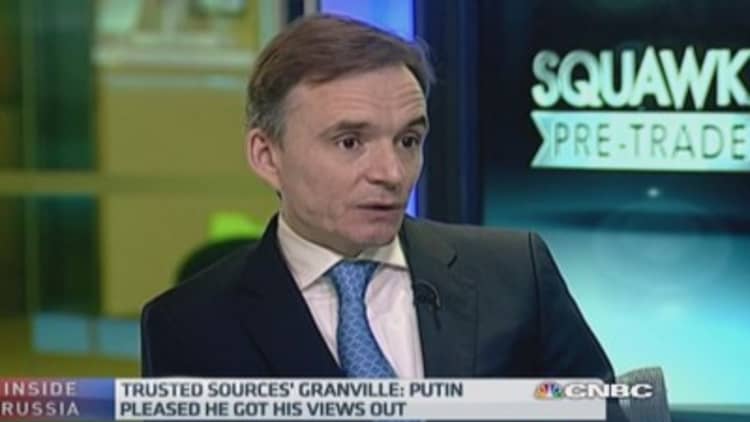The global economy is again showing worrying signs of an imminent financial crisis, according to British Prime Minister David Cameron, who is warning of a dangerous backdrop of instability and uncertainty.
Writing in the U.K.'s Guardian newspaper, he said that this weekend's G-20 summit in Brisbane had further underlined the problems facing the global economy.
"Six years on from the financial crash that brought the world to its knees, red warning lights are once again flashing on the dashboard of the global economy," he said in the article published late Sunday.
Read MoreBanker pay must stop encouraging misconduct: Carney
Global trade talks have stalled, the euro zone is teetering on the brink of recession and emerging markets are now slowing down, he said. The spread of Ebola, the conflict in the Middle East and Russia's "illegal" actions in Ukraine are all adding to the global insecurity, according to Cameron.

His words echo those of the Bank of England last week, which said that there were downside risks for the U.K. from weaker euro area activity which could also weigh on exports and be associated with rising market volatility.
The U.K. is heavily indebted compared to most of its peers but has been praised by organizations like the International Monetary Fund for being the fastest growing G-7 economy since the financial crash of 2008. The government – majority-led by the right-of-center Conservative Party - has followed a path of austerity and fiscal restraint since coming to power in 2010, although it has still missed deficit targets during that period.
Read More Global markets 'living on borrowed time': Wilbur Ross
Criticized at first, the austerity policies have come at the same time as a significant drop in unemployment in the U.K., with the Bank of England now looking to raise interest rates next year. Opposition policymakers argue the country has become unbalanced, with poorer citizens bearing the brunt of the cuts in spending.
This thesis gained some backing on Monday with a new report that showed that the poorest groups in U.K. society lost the biggest share of their incomes on average following the benefit and direct tax changes since 2010. The research, by the London School of Economics and the University of Essex, also showed that the changes have not contributed to cutting the deficit and have instead been spent on tax breaks.
Read MoreJapan shocks as economy slips into recession
In his article, Cameron said that there had been "difficult decisions" in recent years for the U.K. economy but underlined that it was "vital" that the U.K. stuck to its long-term economic plan. With the country heading towards a general election, set to take place in May next year, Cameron also used the article as an opportunity to put forward his case for re-election. His words highlighted that the economy will be a key battleground for politicians next year.
"In six months' time, Britain will face a choice: the long-term plan that has seen it prosper, or the easy answers that would surely have seen it fail," he said.
"By sticking to our long-term plan at home and standing up for Britain's interests abroad, we will do everything possible to protect our economy."


